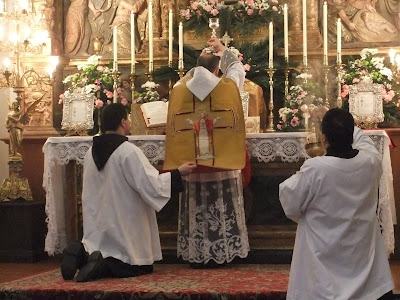
Many might be tempted to ask why we, as Christians, we celebrate an instrument of torture, a sign of distress, failure and defeat. It is true that the Cross expresses all these meanings. Yet, because of that has been raised on the cross for our salvation, represents also the final victory of God's love for all the ills of the world.
An old tradition says that the wood of the cross was taken from a tree planted by Seth, the son of Adam, where Adam was buried. In that same place, known as Golgotha, the place of the skull, Set planted a seed of the tree of knowledge of good and evil, the tree that was in the garden of Eden. Thanks to divine providence, the work of the evil would have been wiped using his own weapons against him.
Deceived by the serpent, Adam turned away from the childlike trust in God and sinned by eating the fruit of one tree in the garden which had been banned. As a result of that sin entered the world of suffering and death. The tragic effects of sin, ie, suffering and death, became quite evident in the history of the descendants of Adam. We heard the first reading today, that evokes the fall and foreshadows the redemption of Christ.
As punishment for their sins, the people of Israel, exhausted in the desert, was bitten by snakes, and was only saved from death by turning its gaze to the command that Moses was high cross that would foreshadow the end of sin, death once and for all. We see clearly that man can not save himself the consequences of his sin. You can not save himself from death. Only God can save him from his moral and physical slavery. And God so loved the world that he sent his only Son, not to condemn the world, as justice required, but that the world might be saved through Him only Son of God has had to be high, as Moses lifted up the serpent in the wilderness, that all who look in faith with life.
The wood of the cross becomes the instrument of our redemption, like the tree that was removed led to the downfall of our parents. The suffering and death consequences of sin, became just the means by which sin was defeated. The innocent lamb was sacrificed on the altar of the cross, however, the immolation of the victim sprouted new life: the power of the evil was destroyed by the power of self-sacrificing love that.
The cross, therefore, is something bigger and mysterious than they may seem at first sight. Certainly it is an instrument of torture, suffering and loss, but at the same time shows the complete transformation, the ultimate victory over these evils, and this makes it the most eloquent symbol of hope that the world has ever seen. Talk to all suffering, the oppressed, the sick, the poor, the marginalized, the victims of violence, and offers them hope that God can turn their pain into joy, communion and isolation in their living death. Offers unlimited hope our fallen world.
is why the world needs the cross. It is not simply a private symbol of devotion, it is a badge of belonging to a group within society, and its deeper meaning has nothing to do with the forced imposition of a creed or a philosophy. About hope, about love, speaks of the victory of non-violence of oppression, speaking of God exalts the humble, gives strength to the weak can overcome the divisions and overcome hatred with love. A world without cross would be a world without hope, a world where torture and brutality would not limit where the weak would be subjugated and greed would have the final word. Man's inhumanity to man is manifested in an even more horrible, and the vicious cycle of violence would never end. Only the cross can end it all. While no earthly power can save us from the consequences of our sin, and no earthly power can defeat injustice at its source, the Love God's redemptive intervention can radically transform the reality of sin and death. This is what we celebrate when we rejoice in the cross of the Redeemer. St. Andrew of Crete rightly describes cross as "the greatest of all goods ... for which and for which culminates our salvation and restoring us to our original state of righteousness" (Sermon 10: PG 97, 1018-1019).
Dear brother priests, religious ones, dear catechists entrusted to us the message of the cross so that we can offer hope to the world. When we proclaim Christ crucified, we do not proclaim ourselves, but to Him do not offer our own wisdom to the world, do not claim any of our merits, but we act as instruments of his wisdom, his love and redemptive merits. We know that we are simply jars of clay, however, have been surprisingly chosen to be messengers of redemptive truth that the world needs to hear. We never tire of admiring the extraordinary grace that is given us, we never cease to acknowledge our unworthiness, but at the same time, let us strive always to be less unworthy of our noble calling, so as not to undermine the credibility of our testimony to our mistakes and falls.
* Benedict XVI. Homily, June 5, 2010



 GLORY GOSPEL
GLORY GOSPEL 


